May 23, 2025 | 04:02 GMT +7
May 23, 2025 | 04:02 GMT +7
Hotline: 0913.378.918
May 23, 2025 | 04:02 GMT +7
Hotline: 0913.378.918

The lush fruit orchard on the rocky cliff of Ly's family. Photo: Tuan Anh.
The story of Pham Duc Ly (Dai An 2 village, Ia Khuol commune, Chu Pah district, Gia Lai province) turning a barren mountainous area into a lush fruit orchard comes up as a mistery. Many people find it hard to believe that difficult fruit trees such as tangerines, oranges, and grapefruits can grow and develop well in such a barren sandy area, a place known as the land where"dogs eat stones, chickens eat gravel".
Pham Quy, Chairman of the Ia Khuol Commune Farmers’ Union, led us to Pham Duc Ly’s orchard, which is located close to the rocky cliff. The orchard is lush of green, the trees are planted in straight rows, subtly lying on the slope.
Ly's family settled in Ia Khuol in 1998. He started out as a motorbike repairman. Seeing that life was unstable, he switched to electrical construction. Later, when he had some capital, his family decided to buy a farm to do agriculture in preparation for the possibility of not having the health to do construction work when they are old.
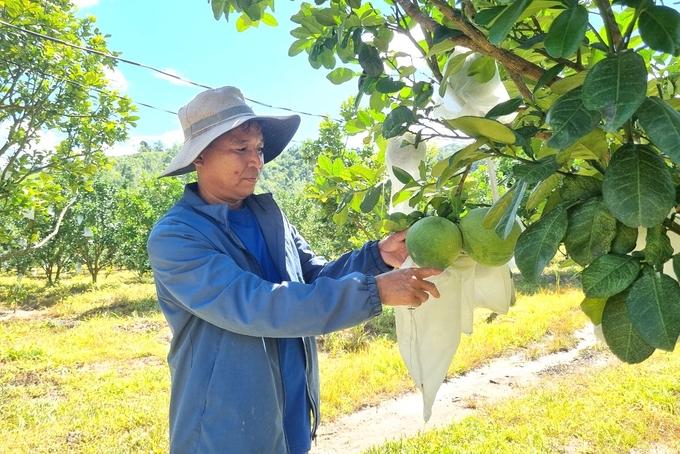
Ly takes care of his family's green-skinned grapefruit trees. Photo: Tuan Anh.
“When I first bought a 1.4 ha plot of land right next to the cliff, many people laughed at me. People asked me if I was crazy to buy this land since no plants could grow here. Nobody would take the land even if it was given for free, but here I was, buying it to plant trees. Hearing that, I could only laugh. I told them that if the land was bad, I should improve it and add more fertilizer. The trees will grow,” said Ly.
The orchard at that time was mainly dry, sandy soil, even cassava could not survive. He began the renovation by plowing, collecting and discarding the gravel and rocks. Next, he spread layers of manure and sugarcane mulch to increase the nutrient contents in the soil. On the other hand, he let the grass grow naturally, then used a machine to cut the tops to create humus and increase the soil's moisture.
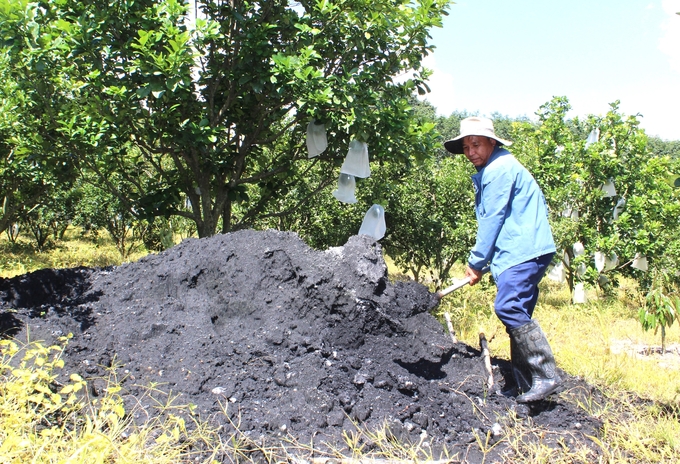
Ly mainly uses organic fertilizer composted with sugarcane mulch in the orchard. Photo: Tuan Anh.
After the land was in a better condition, choosing plants became a difficult problem. Ly himself wanted to make a difference, so he went to many places to learn. He decided to choose citrus fruits such as tangerines, oranges, and grapefruits to plant.
The locals were even more surprised, thinking that he was being unreasonable because growing citrus trees in this kind of land gave the fruit an inedibly sour taste. However, Ly was thorough in his studies. He knew that it was actually a difference in seed variety. Ignoring the ridicule, he traveled to the West to choose the best quality seeds and bring them back to his orchard.
The orchard of Ly’s family is now over 6 years old but is still full of vigor, the yield is always high and stable. To achieve this, in addition to soil improvement and fertilization, irrigation water is a very important factor.
“When I started renovating the garden, I also considered the irrigation issue. I initially planned to build a reservoir and then bring water from the dam for use. Then, I accidentally discovered an underground water source on the top of the mountain and decided to install a pipeline to bring water to the orchard. The water from the mountain flows strong so there is no need to invest in a generator system. I just install water valves in the places where I need to water,” he said.

The "revolution" helps Ly's family not worry about water shortage. Photo: Tuan Anh.
According to Pham Quy, Chairman of Ia Khuol Commune Farmers’ Union, the successful fruit growing model of Ly’s family on arid, sandy land is considered a miracle in the locality. Witnessing it with their own eyes, many households in the area are no longer skeptical. Instead, they come to learn from Ly and ask for his experiences so they can apply them to their family orchards.
“Ly’s fruit orchard model is very effective, bringing in several hundred million of VND in revenue each year. His family has also boldly invested in the land, mainly using organic fertilizers. In particular, Ly has also implemented a ‘revolution’ by bringing water from the mountains to the garden, so there is no fear of water shortage,” Quy said.
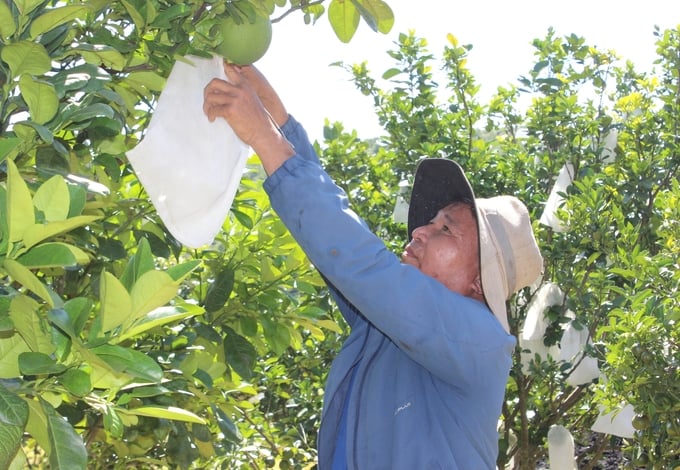
Boldly investing in the arid, sandy land has helped Ly's family reap sweet rewards. Photo: Tuan Anh.
Ly believes that the most important factor for a sustainable orchard is to minimize the use of chemical fertilizers. Overuse of chemicals will cause the soil quality to deteriorate. His family's garden mainly uses biological fertilizers, cow manure combined with sugarcane mulch to fertilize the plants, and only uses a very small amount of chemical fertilizers when the plants are really needed to produce fruit in order to guarantee the fruit’s sweetness.
Translated by Samuel Pham
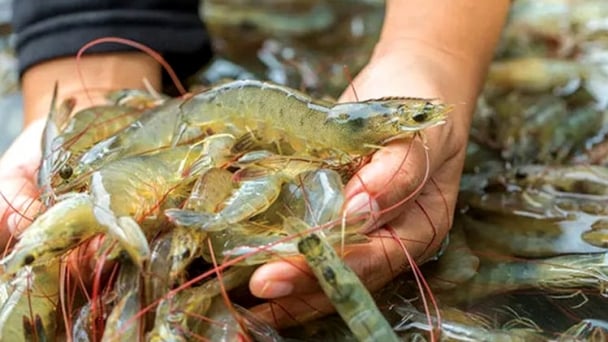
(VAN) A study assessing the carbon footprint of whiteleg shrimp farming in China shows the potential for carbon emission reduction through the use of renewable energy.
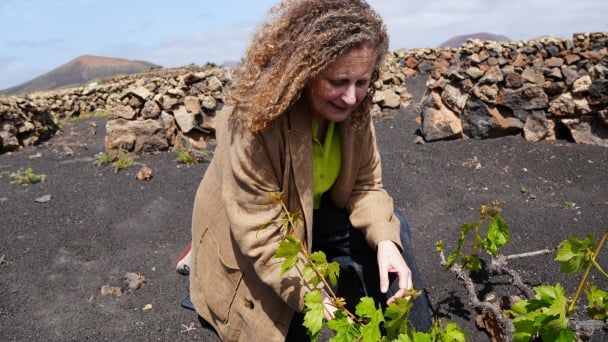
(VAN) Brazil, China, Mexico and Spain receive new designations of Globally Important Agricultural Heritage Systems from FAO.
![Reducing emissions from rice fields: [3] New values generated from carbon credit](https://t.ex-cdn.com/nongnghiepmoitruong.vn/608w/files/content/2025/05/19/dsc09613-144700_71-150957.jpg)
(VAN) In addition to helping safeguard the environment, the low-emission rice cultivation model also generates new opportunities for farmers by leveraging the carbon credit market.
![Ho Chi Minh city adapts to climate change: [1] Vulnerable in the whirlwind of development](https://t.ex-cdn.com/nongnghiepmoitruong.vn/608w/files/duyenht92/2025/05/19/3131-ngap-nongnghiep-163121.jpg)
(VAN) As the country's economic engine with a rapid urbanization rate, Ho Chi Minh city is facing increasingly serious consequences of climate change.

(VAN) On May 21, Minister of Agriculture and Environment Do Duc Duy worked with Mr. Olivier Brochet, Ambassador Extraordinary and Plenipotentiary of the French Republic to Vietnam.

(VAN) VRG recently conducted a visit and working trip to the United States to demonstrate its efforts in redefining the role of rubber enterprises in the global value chain.

(VAN) In 2024, over 295 million people across 53 countries and territories faced acute hunger—an increase of almost 14 million people compared to 2023, while the number of people facing catastrophic levels of hunger reached a record high.